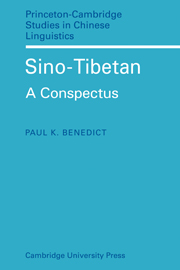Book contents
- Frontmatter
- Foreword
- Contents
- Preface
- Abbreviations
- 1 Introduction
- 2 Taxonomy (general)
- 3 Taxonomy (Sino-Tibetan)
- 4 Tibeto-Burman classification
- 5 Tibeto-Burman reconstruction (history)
- 6 Tibeto-Burman primary sources
- 7 Tibeto-Burman consonants (general; final)
- 8 Tibeto-Burman consonants (initial)
- 9 Tibeto-Burman consonant clusters
- 10 Tibeto-Burman vowels (finals; diphthongs)
- 11 Tibeto-Burman vowels (medials)
- 12 Tibeto-Burman tones
- 13 Tibeto-Burman morphology (history)
- 14 Tibeto-Burman morphology (categories)
- 15 Tibeto-Burman pronouns
- 16 Tibeto-Burman numerals
- 17 Tibeto-Burman morphology and syntax (general)
- 18 Tibeto-Burman affixes (special)
- 19 Tibeto-Burman affixes (general)
- 20 Tibeto-Burman dental suffixes
- 21 Tibeto-Burman prefixes (general)
- 22 Tibeto-Burman prefixed *s-
- 23 Tibeto-Burman prefixed *r-
- 24 Tibeto-Burman prefixed *b-
- 25 Tibeto-Burman prefixed *g-
- 26 Tibeto-Burman prefixed *d-
- 27 Tibeto-Burman prefixed *m-
- 28 Tibeto-Burman prefixed *a-
- 29 Tibeto-Burman alternation (consonantal, vocalic)
- 30 Karen (general)
- 31 Karen morphology (categories) and syntax
- 32 Karen pronouns
- 33 Karen numerals
- 34 Karen prefixes
- 35 Karen initial consonants and clusters
- 36 Karen final consonants and medial vowels
- 37 Karen final vowels and semi-vowels
- 38 Karen tones
- 39 Chinese (general, history)
- 40 Chinese morphology (prefixes, suffixes, alternation)
- 41 Chinese pronouns
- 42 Chinese numerals
- 43 Chinese phonology (history)
- 44 Chinese consonants (initials, finals)
- 45 Chinese consonant clusters
- 46 Chinese vowels and diphthongs
- 47 Chinese tones
- 48 Résumé (Chinese)
- Appendix I Tibeto-Burman roots
- Appendix II English–TB index
- Appendix III Primary Tibeto-Burman sources
- Appendix IV Author's and editor's bibliography
Foreword
Published online by Cambridge University Press: 10 November 2010
- Frontmatter
- Foreword
- Contents
- Preface
- Abbreviations
- 1 Introduction
- 2 Taxonomy (general)
- 3 Taxonomy (Sino-Tibetan)
- 4 Tibeto-Burman classification
- 5 Tibeto-Burman reconstruction (history)
- 6 Tibeto-Burman primary sources
- 7 Tibeto-Burman consonants (general; final)
- 8 Tibeto-Burman consonants (initial)
- 9 Tibeto-Burman consonant clusters
- 10 Tibeto-Burman vowels (finals; diphthongs)
- 11 Tibeto-Burman vowels (medials)
- 12 Tibeto-Burman tones
- 13 Tibeto-Burman morphology (history)
- 14 Tibeto-Burman morphology (categories)
- 15 Tibeto-Burman pronouns
- 16 Tibeto-Burman numerals
- 17 Tibeto-Burman morphology and syntax (general)
- 18 Tibeto-Burman affixes (special)
- 19 Tibeto-Burman affixes (general)
- 20 Tibeto-Burman dental suffixes
- 21 Tibeto-Burman prefixes (general)
- 22 Tibeto-Burman prefixed *s-
- 23 Tibeto-Burman prefixed *r-
- 24 Tibeto-Burman prefixed *b-
- 25 Tibeto-Burman prefixed *g-
- 26 Tibeto-Burman prefixed *d-
- 27 Tibeto-Burman prefixed *m-
- 28 Tibeto-Burman prefixed *a-
- 29 Tibeto-Burman alternation (consonantal, vocalic)
- 30 Karen (general)
- 31 Karen morphology (categories) and syntax
- 32 Karen pronouns
- 33 Karen numerals
- 34 Karen prefixes
- 35 Karen initial consonants and clusters
- 36 Karen final consonants and medial vowels
- 37 Karen final vowels and semi-vowels
- 38 Karen tones
- 39 Chinese (general, history)
- 40 Chinese morphology (prefixes, suffixes, alternation)
- 41 Chinese pronouns
- 42 Chinese numerals
- 43 Chinese phonology (history)
- 44 Chinese consonants (initials, finals)
- 45 Chinese consonant clusters
- 46 Chinese vowels and diphthongs
- 47 Chinese tones
- 48 Résumé (Chinese)
- Appendix I Tibeto-Burman roots
- Appendix II English–TB index
- Appendix III Primary Tibeto-Burman sources
- Appendix IV Author's and editor's bibliography
Summary
The manuscript of this book was originally drafted over a quarter of a century ago. It was a distillation of a far more extensive compilation, ‘Sino-Tibetan Linguistics’, on which Paul Benedict and Robert Shafer had been working for many years and which still exists as an unpublished manuscript, some twelve volumes of it, in the files of the University of California and of the authors.
The fact that the book is published now, as well as the form it takes, is in large measure due to Professor James A. Matisoff of Columbia University. Naturally enough, books which lie unpublished for years gather some dust. They age, even if the facts they contain are relatively unchanging. Other books and articles appear, the documentation comes to seem dated; and the task of bringing the whole up to date becomes an almost superhuman one. Yet Professor Matisoff, discovering that this manuscript existed, perceived that its voluminous data and its almost Copernican vision, viewing the ‘Sino-centric’ linguistic area from a standpoint peripheral to it, had neither been duplicated nor superseded in the years since Dr Benedict completed his work and laid it aside to turn to other things.
The problem was how to produce a book which would preserve the sweep and incorporate the information of the original, but would yet allow acknowledgement of germane work accomplished since it was drafted.
Information
- Type
- Chapter
- Information
- Sino-TibetanA Conspectus, pp. v - viPublisher: Cambridge University PressPrint publication year: 1972
